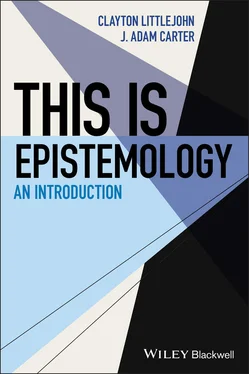Naïve Account of the Conscious Character of Experience
It looks as if there is something white and rectangular in your hands. This is because you're directly aware of something in having this experience. This direct object of awareness just is the page that you're reading. Your experience is the way that it is because the direct object of awareness is white and rectangular. Had the pages been circular or been blue, your experience would have been different because the character of your experience is just directly determined by the qualities of the immediate object of awareness.
If this kind of explanation holds in every case of conscious experience, then this kind of explanation assumes this principle:
Phenomenal Principle : if at some time t it appears to you that there is an F, this is because at t there is something that is F that is the immediate object of awareness. 8
The Phenomenal Principle is so called because it posits a principled connection between the phenomenology of experience (i.e. what your experience is like) and the character of the IOA that your experience relates you to.
2.35The indirect realists think that the Phenomenal Principle tells us something important about the IOA: if it seems visually to you that there is an F present, the IOA is F. The indirect realists use this conditional to attack naïve realism and argue that the naïve realist cannot account for the possibility of illusion and hallucination. In cases of illusion , OMOs are not how they appear. In cases of hallucination , things appear or look a certain way to a subject, but there is no OMO that they're aware of (directly or indirectly). A familiar kind of perceptual illusion is the bent or broken stick. A stick submerged in water might look bent or broken even though it is straight and unbroken. As for hallucination, philosophers might appeal to things like auditory hallucination (described sometimes as hearing things that aren't there) or things like Macbeth's dagger (i.e. a case where it appears as if there is a dagger floating in the air but there is nothing there to be seen).
2.36Why are these cases problematic for the naïve realist? Consider these very simple arguments against the naïve realist's hypothesis that the IOA is an OMO:
Argument from Illusion
P1. In the case of illusion, it appears that something is F but the OMO is not F.
P2. The IOA is F. [P1 and the Phenomenal Principle ]
P3. Nothing can be F and not F. [Leibniz's Law]
C. In the case of illusion, the IOA is not an OMO.
Argument from Hallucination
P1. In the case of hallucination, it appears that something is F but the subject is not aware of any OMO.
P2. The IOA is F. [P1 and the Phenomenal Principle ]
P3. There is no suitable OMO that the subject is aware of that is F.
P4. Nothing can be F and not F. [Leibniz's Law]
C. In the case of hallucination, the IOA is not an OMO.
These arguments start with observations about the phenomenology of some experience (i.e. a description of what it is like to undergo some conscious experience). The Phenomenal Principle tells us that in each experience (whether it is illusory, a hallucination, or just a garden‐variety non‐problematic experience of the sort we normally enjoy) the IOA has the properties it appears to have. Leibniz's Law is a principle from metaphysics that tells us something about identity : it is not possible for one thing at one time to both have and lack some property. At a bare minimum, it isn't right to say that A and B are identical unless they share all the same properties in common. Once we've established that there is no OMO that the thinker is aware of that has all the properties that the IOA has, this suffices to show that the thing we're immediately aware of in cases of illusion and hallucination is not an OMO.
2.37Now, there is a subtle point that we need to take account of. As we noted just now in passing, not every conscious experience is an illusion or hallucination. These arguments tell us nothing about the identity of the IOA in your garden‐variety cases of perception, cases where there is no illusion and no hallucination. Since the naïve realist only says that we are sometimes immediately aware of OMOs, can't the naïve realists say that we are sometimes immediately aware of OMOs? They can, but the indirect realists were wise to this move, so they have argued that we can generalize from the case of illusion to all cases. H.H. Price asks us to consider cases involving “continuity” in which a perceiver sees, say, a cricket ball at a distance and then moves closer and closer to it. From a distance, the IOA is flat. Up close, the IOA is, as he puts it, “bulgy.” Now, the OMO in this case, a cricket ball, is bulgy (and not flat) throughout the episode. If we were to say that the OMO is the IOA only in the case where experience is not illusory, we have to say that the identity of the IOA changes as we move from just the spot where the ball appears as it actually is to the nearest spot where the IOA appears ever so slightly different from the OMO. Price remarks:
Now it seems most extraordinary that there should be a total difference of nature where there is only an infinitesimal difference of quality. It also seems most extraordinary that so radical a replacement should be brought about by an infinitesimal backward movement of the observer's body.
(1950, p. 32)
Translation: it seems that the IOA is the same throughout so long as you're attending to the cricket ball. If, as the Argument from Illusion seems to show, the IOA is distinct from the OMO in the case where the IOA looks flat, the IOA remains distinct from the OMO in the case of veridical experience.
2.6 Evaluating Indirect Realism
2.38We now have a better idea as to why some philosophers have embraced indirect realism. Let's now examine the view more closely. The indirect realist is a realist. She believes in external objects and believes that we can see, feel, hear, touch, taste, and smell such things. She believes that the existence and character of such things does not depend upon our having experiences of them. (The objects in your refrigerator don't pop out of existence when you close the door.) So far, her view agrees with the naïve realist. The key difference, recall, is over the truth of direct realism. The indirect realist thinks that we're never directly aware of OMOs. All awareness of things like tomatoes, hands, friends, cups of coffee, etc. is indirect or mediated, preceded by immediate awareness of sense data.
2.39Sense data are, according to indirect realists, IOAs that have all the properties they appear to have. They are present in cases of veridical perception as well as cases of illusion and hallucination. They are distinct from all OMOs and cannot be observed by anyone who isn't the subject of the experience in which they appear. They are for that reason believed by some to be creatures of mystery. The standard objections to indirect realism focus on sense data. Some would argue that they generate epistemological problems where none should be found. Some would argue that they are spooky to believe in.
2.40We've already seen a glimpse of the epistemological problems that are supposed to arise for the indirect realist. If the indirect realist wants to account for the possibility of perceptual justification and knowledge, she needs to address the argument above which seems to show that indirect realism is incompatible with liberal foundationalism. Indirect realists have two options here. First, they might reply that this argument fails because experience gives us all the evidence we need to believe in OMOs even if we're never directly aware of them. Second, they might try to show that we have additional evidence that secures our right to believe in the OMOs that the indirect realists claim we're never directly aware of.
Читать дальше












